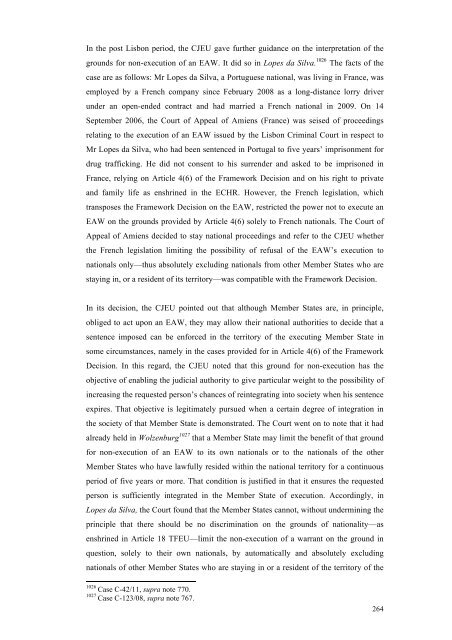The evolution of European Union criminal law (1957-2012)
The evolution of European Union criminal law (1957-2012)
The evolution of European Union criminal law (1957-2012)
You also want an ePaper? Increase the reach of your titles
YUMPU automatically turns print PDFs into web optimized ePapers that Google loves.
In the post Lisbon period, the CJEU gave further guidance on the interpretation <strong>of</strong> the<br />
grounds for non-execution <strong>of</strong> an EAW. It did so in Lopes da Silva. 1026 <strong>The</strong> facts <strong>of</strong> the<br />
case are as follows: Mr Lopes da Silva, a Portuguese national, was living in France, was<br />
employed by a French company since February 2008 as a long-distance lorry driver<br />
under an open-ended contract and had married a French national in 2009. On 14<br />
September 2006, the Court <strong>of</strong> Appeal <strong>of</strong> Amiens (France) was seised <strong>of</strong> proceedings<br />
relating to the execution <strong>of</strong> an EAW issued by the Lisbon Criminal Court in respect to<br />
Mr Lopes da Silva, who had been sentenced in Portugal to five years’ imprisonment for<br />
drug trafficking. He did not consent to his surrender and asked to be imprisoned in<br />
France, relying on Article 4(6) <strong>of</strong> the Framework Decision and on his right to private<br />
and family life as enshrined in the ECHR. However, the French legislation, which<br />
transposes the Framework Decision on the EAW, restricted the power not to execute an<br />
EAW on the grounds provided by Article 4(6) solely to French nationals. <strong>The</strong> Court <strong>of</strong><br />
Appeal <strong>of</strong> Amiens decided to stay national proceedings and refer to the CJEU whether<br />
the French legislation limiting the possibility <strong>of</strong> refusal <strong>of</strong> the EAW’s execution to<br />
nationals only—thus absolutely excluding nationals from other Member States who are<br />
staying in, or a resident <strong>of</strong> its territory—was compatible with the Framework Decision.<br />
In its decision, the CJEU pointed out that although Member States are, in principle,<br />
obliged to act upon an EAW, they may allow their national authorities to decide that a<br />
sentence imposed can be enforced in the territory <strong>of</strong> the executing Member State in<br />
some circumstances, namely in the cases provided for in Article 4(6) <strong>of</strong> the Framework<br />
Decision. In this regard, the CJEU noted that this ground for non-execution has the<br />
objective <strong>of</strong> enabling the judicial authority to give particular weight to the possibility <strong>of</strong><br />
increasing the requested person’s chances <strong>of</strong> reintegrating into society when his sentence<br />
expires. That objective is legitimately pursued when a certain degree <strong>of</strong> integration in<br />
the society <strong>of</strong> that Member State is demonstrated. <strong>The</strong> Court went on to note that it had<br />
already held in Wolzenburg 1027 that a Member State may limit the benefit <strong>of</strong> that ground<br />
for non-execution <strong>of</strong> an EAW to its own nationals or to the nationals <strong>of</strong> the other<br />
Member States who have <strong>law</strong>fully resided within the national territory for a continuous<br />
period <strong>of</strong> five years or more. That condition is justified in that it ensures the requested<br />
person is sufficiently integrated in the Member State <strong>of</strong> execution. Accordingly, in<br />
Lopes da Silva, the Court found that the Member States cannot, without undermining the<br />
principle that there should be no discrimination on the grounds <strong>of</strong> nationality—as<br />
enshrined in Article 18 TFEU—limit the non-execution <strong>of</strong> a warrant on the ground in<br />
question, solely to their own nationals, by automatically and absolutely excluding<br />
nationals <strong>of</strong> other Member States who are staying in or a resident <strong>of</strong> the territory <strong>of</strong> the<br />
1026 Case C-42/11, supra note 770.<br />
1027 Case C-123/08, supra note 767.<br />
264
















